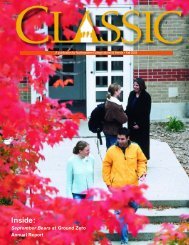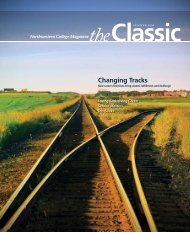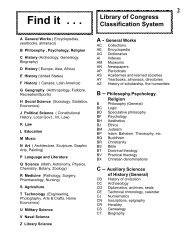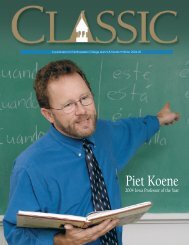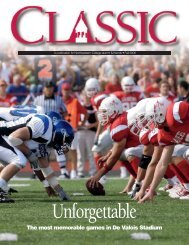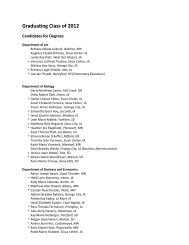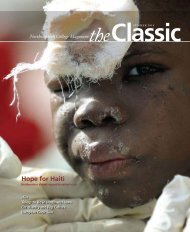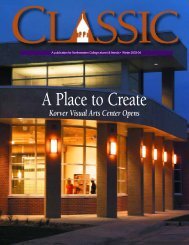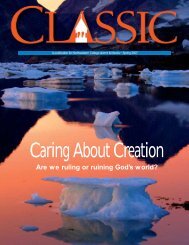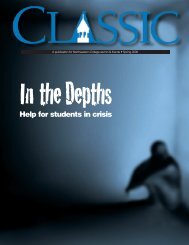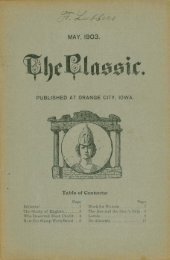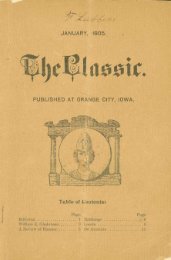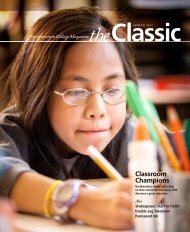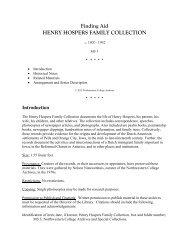Fall 2002 - Northwestern College
Fall 2002 - Northwestern College
Fall 2002 - Northwestern College
- No tags were found...
Create successful ePaper yourself
Turn your PDF publications into a flip-book with our unique Google optimized e-Paper software.
P re s i d e n sre t ’ p o rt<br />
N o r t h w e s t e r n C l a s s i c<br />
D r. Bruce Murphy<br />
P re s i d e n t<br />
How firm a foundation<br />
This past June <strong>Northwestern</strong> hosted the General Synod of the Reformed<br />
C h u rch in America (RCA). Led by Harold Van Der Weide, our beloved and<br />
retiring director of church relations, a strong team of campus and community<br />
leaders did an outstanding job of welcoming, serving and entertaining the<br />
m o re than 500 delegates from around the world.<br />
As host president I was responsible for presenting the Report from the<br />
<strong>College</strong>s. This gave me the opportunity to reflect with the delegates on the<br />
mission of Christian colleges in general, on Reformed colleges in particular,<br />
and, especially, on <strong>Northwestern</strong> .<br />
N o r t h w e s t e rn has a unique mission. It is intentionally ecumenical,<br />
evangelical and Reformed. We welcome all students who believe in the transforming power of<br />
Jesus Christ. We also accept some non-Christians who are open to the truths of the Scripture s .<br />
With other “Christian” colleges, <strong>Northwestern</strong> seeks to provide an excellent, academically rigorous,<br />
holistic education, in the context of a caring Christian community. This is indeed a high calling.<br />
But as a college in the Reformed tradition, deeply grateful for our long, vital re l a t i o n s h i p<br />
with the RCA, we seek to do more .<br />
▼<br />
“A Christian worldview, I<br />
l e a rned, was a step beyond<br />
personal faith, one that<br />
enabled a young man or<br />
woman to make some<br />
sense of the world—in all<br />
its facets—social, political,<br />
economic, cultural and<br />
s p i r i t u a l . ”<br />
Allow me to be autobiographical for a moment. I am an adult convert to the Reformed tradition. I grew up in a loving<br />
Christian home and a warm non-denominational church. When I was about 11 years old I made a personal confession of<br />
faith. This has remained the single most important decision in my life. A few years later I attended a highly-respected nondenominational<br />
Christian college and benefited greatly from the academic demands and Christian ethos on that campus. Still,<br />
despite these supportive beginnings, I was not pre p a red for the cultural tumult of the late 1960s and in particular for the<br />
Vietnam Wa r.<br />
By the providence of God my first teaching position after completing my graduate work and re t u rning from Vietnam was<br />
at <strong>Northwestern</strong> <strong>College</strong>. Under the tutelage of President Lars Granberg—a devout evangelical and ecumenical Christian—I<br />
was introduced to the uniquely Reformed notion of a Christian worldview. A Christian worldview, I learned, was a step<br />
beyond personal faith, one that enabled a young man or woman to make some sense of the world—in all its facets—social,<br />
political, economic, cultural and spiritual. It was a set of principles, thoughtfully developed, that serve as a foundation for all of<br />
l i f e ’s decisions. Rooted in the Scriptures, a Christian worldview provides fabric to faith and direction to zeal.<br />
Back in the early 1970s all of this was new to me; since that time it has greatly influenced my commitments and sense of call.<br />
To d a y, we live in a non-denominational age in which Christian faith itself is valued over individual religious traditions.<br />
T h e re is much here to be applauded. Unfortunately, however, it sometimes means that we forget the unique and important<br />
contributions of particular traditions. At NWC we are proud of our denominational ties, not because they separate us fro m<br />
others but because they highlight our contribution to the wider kingdom of God.<br />
▲<br />
Students indicate satisfaction<br />
N o r t h w e s t e rn s ’ students<br />
feel good about their college<br />
experience—and at a higher<br />
rate than do students at other<br />
Christian colleges. That’s<br />
a c c o rding to a review of data<br />
f rom the Student Satisfaction<br />
I n v e n t o ry, which was taken<br />
by students at <strong>Northwestern</strong><br />
and other members of the<br />
Council for Christian<br />
<strong>College</strong>s and Universities<br />
(CCCU) last fall.<br />
In every area of the survey—which<br />
includes instructional<br />
effectiveness, academic<br />
advising, student centere d-<br />
ness, financial aid, serv i c e<br />
excellence, safety and campus<br />
life, among others—the mean<br />
s c o re of NWC students was<br />
higher than the mean score<br />
of all students at CCCU<br />
schools. “Our students are<br />
significantly more satisfied<br />
than are students at other<br />
CCCU schools,” says Dr.<br />
Doug Trimble, associate professor<br />
of psychology and<br />
c o o rdinator of learn i n g<br />
assessment. This also holds<br />
true when compared to the<br />
mean score of all private colleges,<br />
Trimble adds.<br />
In addition, the data<br />
show a steady increase in satisfaction<br />
levels among NWC<br />
students compared to 1996<br />
and 1998, when the test also<br />
was administered on campus.<br />
continued on page 7<br />
2 ▲ F a l l 2 0 0 2



